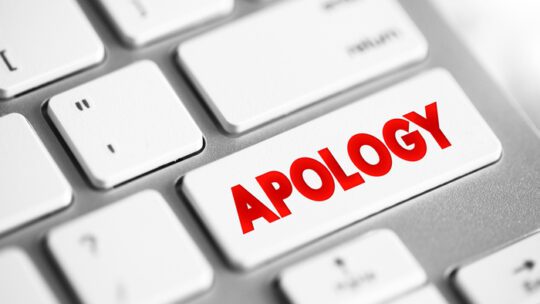
[Editor’s Note: Too often an apology in a PR crisis can seem formulaic. The company or person admits they’ve done something wrong, issues an apology and all is forgiven. It's too easy sometimes.
Indeed, before Whoopi Goldberg eventually apologized for her Jan. 31 remark that “the Holocaust was not about racism,” she seemed to imply that a lot of public apologies are insincere. During Stephen Colbert’s show, Goldberg insisted she didn’t want to “fake apologize.”
Similarly, some recent apologies in PR crises and incidents seem pro forma and insincere. The LIV golf tour’s clarification of Greg Norman saying Jamal Khashoggi’s murder was a “mistake” seemed to be as poorly crafted as Norman’s initial remarks.
Moreover, the author of a controversial Feb. 22 PRNEWS essay argues that cancel culture sometimes renders well-written apologies moot.
We discuss that article and the importance of an apology with Nicki Gibbs, chief strategy officer, Beehive Strategic Communication, and Dr. Kerry O’Grady, faculty director and associate professor, Georgetown University School of Continuing Education. Their remarks were edited lightly for space and clarity.]
Crisis Insider: Despite criticism that apologizing is too easy and that some apologies sound heartless and resemble legal documents, apologizing remains the standard for companies and individuals who’ve made mistakes, right?

Nicki Gibbs: It depends on the issue and the circumstances. I don’t know if there’s a blanket statement that covers that anymore. Hollow apologies, platitudes, performative responses are pointless. In fact, they’re probably more damaging than effective.
But acknowledging human emotion and creating a human connection [through an apology] still continues to be important and credible.
CI: What’s in a good apology?
Gibbs: An acknowledgment of the issue and then some alignment of what do we own and not own in the circumstance and some accountability. The most important part after all that is what are you going to do? What are the actions that are going to, hopefully, rectify the situation and make sure it doesn’t happen again? The apology can’t be the end. If you’re going to promise to act then you need to act. Then follow up and report on what you’ve done.
Whether you are a public person or a company, if you’ve been behaving in alignment with your values, hopefully you’ve developed enough of a reservoir of trust. So, if you find yourself in a position [where you’ve done something wrong], an apology will have credibility, because you’ve behaved in a responsible way leading up to that moment.
Every person in every organization is going to have something to apologize for. We’re humans and don’t always make good choices.

Kerry O’Grady: I pretty much agree with everything Nicki said and I vehemently disagree with [the PRNEWS] article. There’s something about healing that comes from an apology that most humans identify with…if you show, with action, that you’re trying to make it right, it will be enough for most human beings to forgive you. If somebody does not forgive you, that’s their decision and you’ve said and done everything you could.
As a PR practitioner, we hang our hat on what we are able to control vs what we are unable to control. An apology is something we are always able to control.
CI: Did you agree with Nicki about the elements of an effective apology?
O’Grady: Yes. I’ll add that Legal cannot write the apology. Period. Humanness, no jargon and the use of plain-speak are so important in an apology. Otherwise, people will see through it.
And there’s a difference between an organization’s apology and an individual’s apology. An organization apologizes when it does something wrong and that reflects on the company.
There are very specific instances where a company should apologize: a product fail; the company promises something and it didn’t deliver it; and if a product is low quality.
But when an individual from an organization has a meltdown and it’s not reflective of the organization, there’s an apology needed, but it’s not the same apology [as a corporate apology], though it’s in the same framework. It’s more an I statement than a We statement.
CI: What about timing? What if you’ve lied repeatedly about something and finally you’re caught red-handed. Does an apology work?
Gibbs: Timing is an interesting question. There can be a [quick] acknowledgment that something dangerous, embarrassing, unethical, disappointing has happened; take your pick. There can be an immediate acknowledgment that something has not gone well. It’s important to acknowledge that you’re aware. As a human being and as an organization: We’re aware something happened.
But, you can still take that time to be accountable and authentic. To be reflective and understand what your actions are….
So, think about [your reaction] like any other crisis situation. What happens immediately? What happens in the first 24 hours, and then what does the tail look like? If you’re thinking authentically about an apology, it really follows that same sort of timeline.
It often can be dangerous to say too much immediately, in the moment. People are emotional and passions are running high. So, a little bit of input from the legal team can be helpful. But, they don’t get the last word. [Legal] needs to let people be people.
There are certain areas where organizations don’t want to claim responsibility for in an apology for legal reasons. But that’s sort of a no-fly zone. You just stay away from that territory and think about what else you can say that is authentic and heartfelt.
So, again, not a single answer, it’s case by case. But all those good, smart crisis preparedness rules still apply.
O’Grady: I agree, timing is an interesting question. The faster you can acknowledge that something is wrong, the better and more forgiving the audience will be.
Still, I know many organizations that have misstepped for years and just didn’t get caught. And when they finally [are] caught, it’s all in how you handle it. A really good, sincere apology for your actions and owning…and the immediate next steps, beyond firing someone, can still be effective. Even if a little bit of time later. Again, people are pretty forgiving.
Where things get tricky is when you sit on it even longer than you need to. People can smell fear in the water.
I disagree with legal teams all the time. They say We shouldn’t apologize because anything we say is going to be admissible in court. But my argument is, Well, if you don’t apologize, what’s your lawsuit going to look like then? It’s very possible if you don’t handle something that’s serious with an apology, you’re going to end up [in a lawsuit] anyway.
In any case an apology is good. It’s the framing of the apology, depending on the timing, that’s really important.
So, I advise if you find out something immediately went wrong, you go in the same place where the complaint came from and you [express] regret.
You don’t have to say It’s our fault. That language will trip off Legal right away.
Instead, you say, we regret the actions of this individual or we don’t stand by that…these are the actions we are taking to rectify that immediately.
Audiences don’t care how sorry you are; they care about the actions you’re going to take to fix it.
If it’s something longer term [that just came to light], that’s when you need the legal team even more. In case it goes to court you have that great balance between protecting yourself as an organization but still being sorry for what you did.
CI: Are people and organizations more enlightened about the importance of apologizing? Is it easier now, in that sense, to do crisis communication? Do you get less pushback from Legal and the C-suite than you used to? Or, is it still Let’s not apologize. Let’s keep going and hope nobody will notice?
Gibbs: I don’t know if I’ve found it easier to craft or convince around apologies.
But people are much more sophisticated about the environment and what’s at stake. Particularly since we’ve gone through waves and waves of crises in this country over the last two years. It’s alleviated the human fear, the fight or flight response that comes with an issue or crisis.
You’re able to say, How does this stack up with our values? About who we stand for? About how we stand up? And, how did our actions or behavior align with those? Is there something we have to own?
So, it’s a more sophisticated conversation and more thoughtful, but I wouldn’t say it’s easier. Still, organizations and individuals have risen to the occasion more thoughtfully than they have in the past.
O’Grady: I’m actually not finding that. People are running more scared than ever. With our society, with mental health being a taboo topic, with ethics being a taboo topic, with the pandemic being a taboo topic, with racial justice being a taboo topic, I’m seeing that more people want to be in the room and talk about an apology, but [they never issue an apology].
[Instead] it defaults to It will die and if we sweep it under the rug it may not smell as bad. People are staying in that fear pocket, instead of doing the courageous and brave thing, which is…admitting something was wrong.
There’s so much fear of backlash from media and social media that there’s a paralysis, where pre-pandemic you might have been able to have a more reasonable conversation. Hey, we messed up. Let’s talk about it. Instead, it’s more, We have to protect ourselves and our leadership. It’s very frustrating.
Gibbs: Kerry, do you think that’s what the article was getting at? Fear of mob mentality and cancel culture create that atmosphere and environment of fear? And maybe that shines a light on what passed for an apology a few years ago will not meet the bar today?
So, the legal apology or benign blanket statement apology that would have worked in the past will no longer cut it. So, you have to have those deeper, harder conversations. That’s where you see the fear.
It takes a lot of counsel. [Kerry] used a great word: courage. It takes a lot of [courage] for individuals and organizations to step into that. Those are harder conversations. It’s not easier or faster than in the past, but hopefully it’s more meaningful or effective in those instances.
O’Grady: That’s really interesting. Everybody is afraid of cancel culture. And the answer is not what that article says, which is why bother apologizing, because everyone is going to embark on cancel culture.
That very well might be true. You might end up like that.
But people are expecting more from organizations because of what’s happening in the world than ever. [Unfortunately,] instead of meeting the challenge of a better, more authentic apology, being more human…and showing vulnerability, which institutions still fear, [companies and some people are wrongly] hoping, Well, if we don’t say anything, it will just go away.
Or, If we complain that past apologies aren’t good enough…we’re just not going to say anything.
But [if you do nothing] these issues don’t get resolved.
Leadership fails us when it comes to training on how to have difficult conversations about race, mental health and therefore, when leadership is forced to say something or apologize it doesn’t know how, so [leadership] just doesn’t do it. None of those is a good answer.
What should happen is the PR person should be in the room; to your good point, Legal should not have the last say. But you have to say something. Otherwise, no one is going to forgive you and it’s never going to go away.
Gibbs: This is another case for why issues and crisis preparedness are really critical and why as an organization being really clear about purpose and values is critical.
Because if you are behaving in accordance with your values–and hopefully you have credibility and a track record–if you find yourself in a sticky situation, it gives you a moral framework to apologize and address moral breakdowns and things that have happened, against the backdrop of something inside your organization that is measurable and established.
It's part be prepared and part be prepared to step up if you need to.
